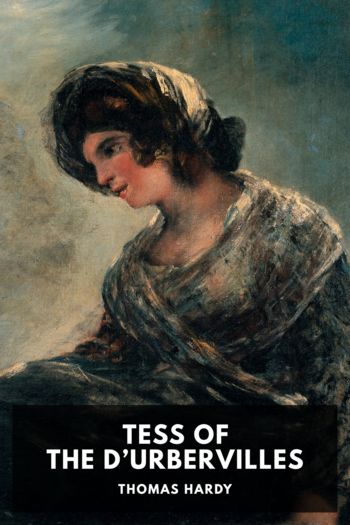Tess of the d’Urbervilles - Thomas Hardy (best color ereader .txt) 📗

- Author: Thomas Hardy
Book online «Tess of the d’Urbervilles - Thomas Hardy (best color ereader .txt) 📗». Author Thomas Hardy
On a thyme-scented, bird-hatching morning in May, between two and three years after the return from Trantridge—silent, reconstructive years for Tess Durbeyfield—she left her home for the second time.
Having packed up her luggage so that it could be sent to her later, she started in a hired trap for the little town of Stourcastle, through which it was necessary to pass on her journey, now in a direction almost opposite to that of her first adventuring. On the curve of the nearest hill she looked back regretfully at Marlott and her father’s house, although she had been so anxious to get away.
Her kindred dwelling there would probably continue their daily lives as heretofore, with no great diminution of pleasure in their consciousness, although she would be far off, and they deprived of her smile. In a few days the children would engage in their games as merrily as ever, without the sense of any gap left by her departure. This leaving of the younger children she had decided to be for the best; were she to remain they would probably gain less good by her precepts than harm by her example.
She went through Stourcastle without pausing and onward to a junction of highways, where she could await a carrier’s van that ran to the southwest; for the railways which engirdled this interior tract of country had never yet struck across it. While waiting, however, there came along a farmer in his spring cart, driving approximately in the direction that she wished to pursue. Though he was a stranger to her she accepted his offer of a seat beside him, ignoring that its motive was a mere tribute to her countenance. He was going to Weatherbury, and by accompanying him thither she could walk the remainder of the distance instead of travelling in the van by way of Casterbridge.
Tess did not stop at Weatherbury, after this long drive, further than to make a slight nondescript meal at noon at a cottage to which the farmer recommended her. Thence she started on foot, basket in hand, to reach the wide upland of heath dividing this district from the low-lying meads of a further valley in which the dairy stood that was the aim and end of her day’s pilgrimage.
Tess had never before visited this part of the country, and yet she felt akin to the landscape. Not so very far to the left of her she could discern a dark patch in the scenery, which inquiry confirmed her in supposing to be trees marking the environs of Kingsbere—in the church of which parish the bones of her ancestors—her useless ancestors—lay entombed.
She had no admiration for them now; she almost hated them for the dance they had led her; not a thing of all that had been theirs did she retain but the old seal and spoon. “Pooh—I have as much of mother as father in me!” she said. “All my prettiness comes from her, and she was only a dairymaid.”
The journey over the intervening uplands and lowlands of Egdon, when she reached them, was a more troublesome walk than she had anticipated, the distance being actually but a few miles. It was two hours, owing to sundry wrong turnings, ere she found herself on a summit commanding the long-sought-for vale, the Valley of the Great Dairies, the valley in which milk and butter grew to rankness, and were produced more profusely, if less delicately, than at her home—the verdant plain so well watered by the river Var or Froom.
It was intrinsically different from the Vale of Little Dairies, Blackmoor Vale, which, save during her disastrous sojourn at Trantridge, she had exclusively known till now. The world was drawn to a larger pattern here. The enclosures numbered fifty acres instead of ten, the farmsteads were more extended, the groups of cattle formed tribes hereabout; there only families. These myriads of cows stretching under her eyes from the far east to the far west outnumbered any she had ever seen at one glance before. The green lea was speckled as thickly with them as a canvas by Van Alsloot or Sallaert with burghers. The ripe hue of the red and dun kine absorbed the evening sunlight, which the white-coated animals returned to the eye in rays almost dazzling, even at the distant elevation on which she stood.
The bird’s-eye perspective before her was not so luxuriantly beautiful, perhaps, as that other one which she knew so well; yet it was more cheering. It lacked the intensely blue atmosphere of the rival vale, and its heavy soils and scents; the new air was clear, bracing, ethereal. The river itself, which nourished the grass and cows of these renowned dairies, flowed not like the streams in Blackmoor. Those were slow, silent, often turbid; flowing over beds of mud into which the incautious wader might sink and vanish unawares. The Froom waters were clear as the pure River of Life shown to the Evangelist, rapid as the shadow of a cloud, with pebbly shallows that prattled to the sky all day long. There the water-flower was the lily; the crowfoot here.
Either the change in the quality of the air from heavy to light, or the sense of being amid new scenes where there were no invidious eyes upon her, sent up her spirits wonderfully. Her hopes mingled with the sunshine in an ideal photosphere which surrounded her as she bounded along against the soft south wind.





Comments (0)